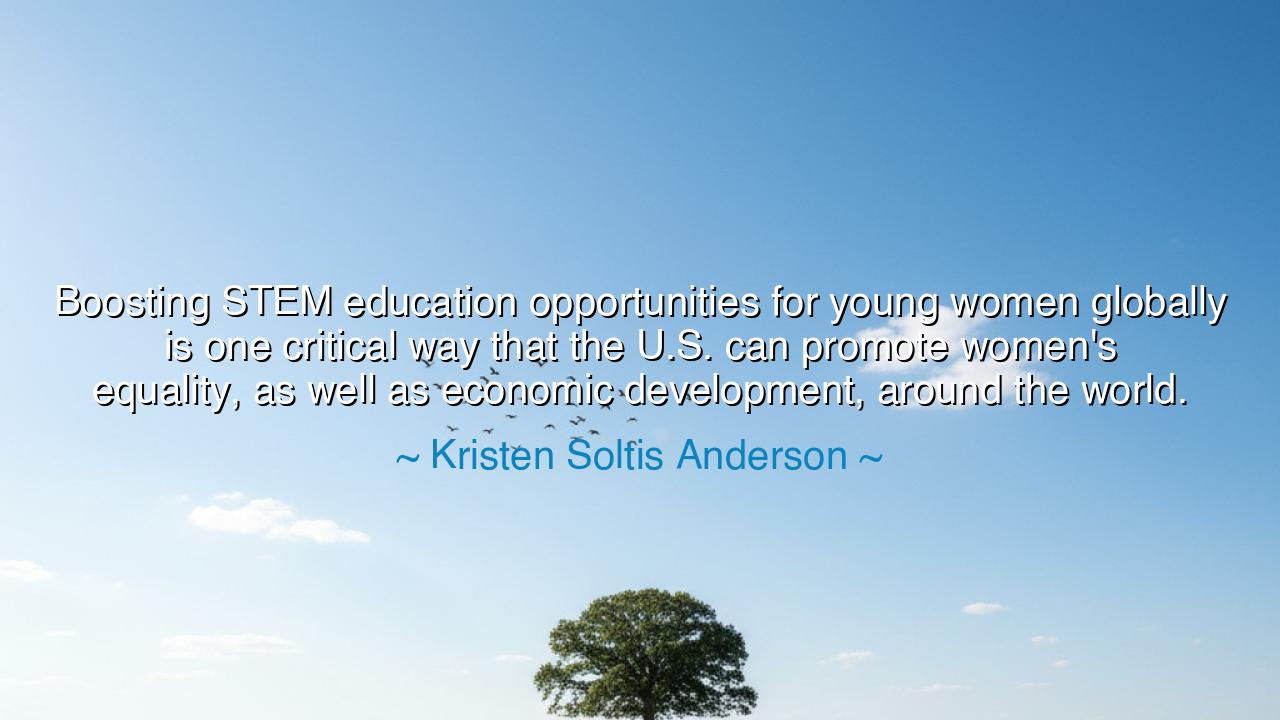
Boosting STEM education opportunities for young women globally is
Boosting STEM education opportunities for young women globally is one critical way that the U.S. can promote women's equality, as well as economic development, around the world.






O Children of the Future, hear the words of Kristen Soltis Anderson, a voice that calls for action, for empowerment, and for equality. She declares, "Boosting STEM education opportunities for young women globally is one critical way that the U.S. can promote women's equality, as well as economic development, around the world." In these words, Anderson speaks not only of the importance of education but of a path forward, a way to bridge the gap between the potential of women and the barriers they face. She points to the field of STEM—Science, Technology, Engineering, and Mathematics—as a powerful avenue through which women's equality can be realized, not just in the U.S., but across the globe. It is through knowledge and innovation that the power to change societies and economies lies.
In the ancient world, O Children, education was the cornerstone of power—yet it was a privilege afforded to only a select few. Plato, in his ideal society, spoke of the importance of knowledge, of reason, and of wisdom as the foundation upon which a just society should be built. Yet even in Plato’s ideal world, women were largely excluded from the intellectual and political spheres. They were not given the same opportunities for learning as their male counterparts, relegated to roles that confined them to the home and the care of children. Plato may have spoken of equality in some sense, but in his world, the path to knowledge was closed to many, especially women. The idea that women could participate equally in intellectual life was a foreign concept—one that we are still working to realize in our time.
Consider the story of Hypatia of Alexandria, a brilliant mathematician and philosopher who lived in Egypt during the 4th and 5th centuries. Hypatia was a teacher and a scholar, admired by many for her knowledge and wisdom. She challenged the traditional roles of women in her society and proved that knowledge and learning were not bound by gender. Yet, despite her brilliance, she was murdered by a mob who feared the power of her intellect and influence. Hypatia’s life is a testament to the fact that women have always had the capacity for greatness, and when given the opportunity to learn, they have the power to change the world. However, her tragic end also shows how societies have historically restricted the access of women to education and power, thus limiting their potential and, in turn, the progress of society as a whole.
Kristen Soltis Anderson's words are a modern echo of Hypatia’s struggle. She understands that education—especially in the fields of STEM—is the key to unlocking the potential of young women around the world. STEM education is not just about learning technical skills; it is about giving young women the tools they need to participate fully in shaping the future of our world. It is about empowering them to enter fields that have been historically dominated by men and to break down the barriers that have long confined them to roles deemed "appropriate" for their gender. As the world moves toward an increasingly technological and globalized future, the lack of representation of women in STEM fields becomes not just a gender issue, but a global economic issue.
Consider the modern-day example of Marie Curie, one of the greatest scientists in history. Her groundbreaking work in radiology not only advanced science but also helped lay the foundation for medicine in the 20th century. Curie’s success, however, was not just a triumph of scientific achievement—it was a victory for women's equality. She was able to challenge the traditional norms of her time and pursue knowledge in a field that was dominated by men, facing not only societal prejudice but also personal sacrifice. Her legacy has paved the way for future generations of women in STEM, showing that with education, women can overcome the barriers placed before them and contribute to global progress.
The lesson, O Children, is this: the path to equality is often paved with knowledge. STEM education is not merely a tool for personal advancement—it is a force for societal transformation. When young women are given the same educational opportunities as their male counterparts, they are not only equipped to build their own futures, but they are empowered to shape the world in ways that benefit everyone. Economic development and equality are intertwined, and both are only possible when all people, regardless of their gender, have access to the tools that will allow them to reach their full potential.
And so, O Children, what must you do? You must champion the cause of education for all. Encourage young women in your lives to pursue STEM—to seek the knowledge and skills that will enable them to enter fields that have been traditionally dominated by men. Advocate for policies that support equal access to education, ensuring that gender is never a barrier to learning. Understand that when women’s potential is unleashed through education, they do not just change their own lives—they change the very fabric of society. The fight for women’s equality is not just about changing laws; it is about changing minds, about building a world where knowledge and education are the foundation of freedom, justice, and progress for all.
Let the words of Kristen Soltis Anderson guide you, O Children. The future of economic development and equality lies in the hands of those who embrace education as the key to unlocking human potential. Let your actions create a world where women’s voices are heard in every field, and where gender is never an obstacle to the pursuit of greatness. In this, you will build not just a better world, but a just and equal one for all.






AAdministratorAdministrator
Welcome, honored guests. Please leave a comment, we will respond soon